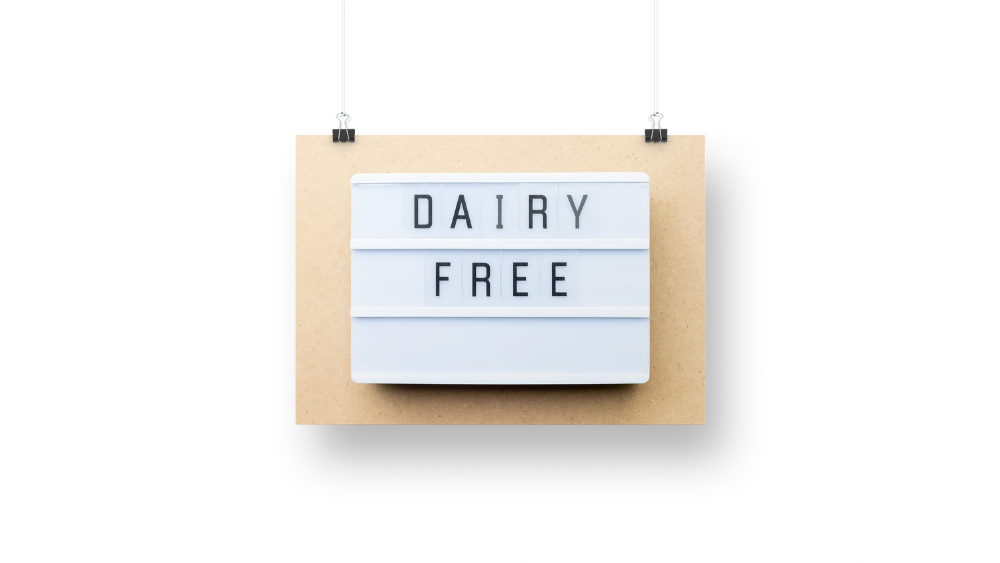It can be hard to figure out whether dairy is causing you problems, let alone determine if you have a milk intolerance or allergy. Here’s what you need to know before going dairy free.
Most people who ‘react’ to dairy are either:
- Intolerant to the lactose (milk sugar) in cow’s milk
- Intolerant to the protein in cow’s milk
- Allergic to the protein in cow’s milk.
Knowing whether you have a milk intolerance or allergy helps you determine whether you need to completely avoid dairy or not. Let’s take a closer look at each condition.
Lactose Intolerance
The enzyme lactase breaks down lactose. If you don’t make enough of this enzyme, lactose will move through your gut undigested causing symptoms such as nausea, cramping, bloating, gas and diarrhoea. This is ‘lactose intolerance’. It’s relatively common among adults, but rare in young children (unless there’s underlying gut damage, such as is seen with coeliac disease).
How do I know if I have a lactose intolerance?
Taking lactose out of your diet and seeing if your symptoms disappear is the most common way of diagnosing a lactose intolerance. A careful re-introduction will help to determine your level of tolerance. Most people with a lactose intolerance can eat a small amount without symptoms.
What should I avoid if I have a lactose intolerance?
If you have a lactose intolerance, you don’t need to avoid dairy completely. Some dairy products, including hard cheeses and butter, naturally contain low levels of lactose. Lactose-free milks, yoghurts and cheeses are also available in most supermarkets. These are made from cow’s milk, so you don’t miss out on the nutrients, only the lactose.
Cow’s milk protein intolerance
Cow’s milk protein intolerance is when your body reacts negatively to the protein in cow’s milk. More research is needed before this condition is fully understood. Symptoms may include nausea, gas, abdominal pain, diarrhoea, constipation, nasal congestion, skin rashes or eczema.
How do I know if I have a cow’s milk protein intolerance?
Medical testing isn’t generally helpful in the diagnosis of a cow’s milk protein intolerance. Usually, you’ll need to completely eliminate dairy, then work through a careful re-introduction process. In my experience, not many people manage this well without support. Cow’s milk is present in many foods, some of which you’d never expect, so you’ll need help learning what to avoid. My free online guide ‘Is it dairy free?’ can help here. The length of time you eliminate milk for, and the re-introduction process, are important.
What should I avoid if I have a cow’s milk protein intolerance?
The management of cow’s milk protein intolerance varies from person to person. Your symptoms may disappear if you remove only the visible dairy from your diet such as milk, yoghurt, cheese, cream and ice-cream. Equally, you may not keep symptoms at bay without removing every trace of cow’s milk protein from your diet.
Cow’s milk allergy
A cow’s milk allergy occurs if your immune system reacts abnormally to the protein in milk. Milk allergies are quite common in young children, affecting about one in 50. As most children grow out of their allergy, it’s not as common in adults. Symptoms can include reflux, vomiting, diarrhoea, poor weight gain, eczema, hives, tingling of the mouth, wheezing, or swelling of the lips, face or eyes1. Reactions to cow’s milk are usually mild, but severe reactions, like anaphylaxis, can also occur.
How do I know if I have a cow’s milk allergy?
If you think you or your child might be allergic to cow’s milk, talk to your GP. Diagnosis typically involves skin prick and/or blood testing.
What should I avoid if I have a cow’s milk allergy?
If you’re allergic to cow’s milk, it’s important to follow the advice of your specialist. Usually, you’ll need to avoid any foods that contain cow’s milk and the milk from other mammals such as goats or sheep. This takes some knowledge, as milk-based ingredients aren’t always easy to recognise.
If you react to dairy, spending time figuring out whether you suffer from a milk intolerance or allergy is well worth the energy. Please remember though, it’s not a good idea to remove dairy from your or your child’s diet for extended periods without seeking nutritional advice. This is because dairy is a good source of many of the minerals and vitamins we need for good health.
References:
1 Allergy New Zealand (http://www.allergy.org.nz/)
You can access my free online guides here. If you’d like more information about dairy intolerance or the dairy free diet, get in touch or book a consultation with me.
Join my email list and receive my latest articles, updates & advice delivered straight to your inbox.

